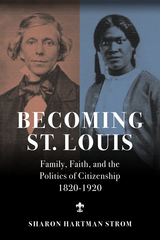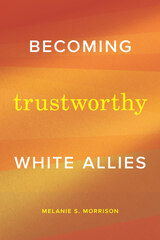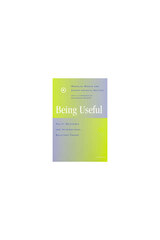
“Why Do We See Lysenko-Type Mass Delusions in Western Democracies?”
We’ve learned enough to know that Global Warming Catastrophism and the mass homicide of the Covid “vaccines” are totalitarian insanities. But can Mattias Desmet’s theory fully account for these recurring outbreaks of mass psychosis?
“Here’s Why There Can Never Be a Marxist Revolution”
There are two irrefutable reasons why genuine Marxism can never succeed. But failed fake Marxism is a real threat to all of us, especially the working class.
“The Five Times George Orwell Changed His Mind”
We can best understand George Orwell’s thinking by looking at the five occasions when he underwent a major change in his political outlook.
“The Most Evil Man in History”
Ayn Rand and her slavish worshipers depict Immanuel Kant as the Fountainhead of Evil. But in point of fact, Kant was a far greater friend of liberty and objective truth than the muddleheaded Miss Rand could ever be.
“Sam Harris and How to Spot Dangerous Ideas”
Sam Harris made his fame and his fortune by claiming that suicide bombings occur because of what the Quran tells Muslims. But the truth is that suicide bombings—by Muslims, atheists, and, yes, Christians—occur because they are the most cost-effective means for militarily weak populations to hit back against oppressive foreign occupation.
“Dexter the Busy Bee”
The serial killer Dexter Morgan confers a huge social benefit by deleting bad guys, illustrating the point made by Dr. Bernard Mandeville, that viciously-motivated behavior may give us a valuable public outcome.
“The Conquistador with His Pants Down”
Dr. Sigmund Freud, who likened himself to a conquistador, marketed a deceptive story about what his patients had told him. This false tale has been thoroughly exposed, and the slippery doctor doesn’t come out smelling like a rose.
“Dr. Peterson! Clean Up Your Theory!”
Jordan Peterson is a teller of stories and of stories about stories. But his stories about stories are provably false, and his interpretations of the stories are no more than Rorschach patterns for his own subjective fantasies.
“Is It a Fact that Facts Don’t Matter?”
Scott Adams denigrates truth, yet he continually appeals to facts. And the fact is that truth is a powerful influence in human affairs.
“An Inconceivably Humble Defense of the Inconceivably Holy Book”
In the year 112,075, humankind has recovered from the latest Ice Age and founded a new religion based on an ancient book. You’ll be surprised what our future descendants make of this charming tale recovered from our time.
“Some Second Thoughts on Atheism”
The author of Atheism Explained comes back to look again at this messy topic and mop up some of the mess.
David Ramsay Steele is the author of The Mystery of Fascism: David Ramsay Steele’s Greatest Hits (2019), Orwell Your Orwell: A Worldview on the Slab (2017), Therapy Breakthrough: Why Some Psychotherapies Work Better than Others (with Michael R. Edelstein and Richard K. Kujoth, 2013), Atheism Explained: From Folly to Philosophy (2008), Three Minute Therapy: Change Your Thinking, Change Your Life (with Michael R. Edelstein, 1997), and From Marx to Mises: Post-Capitalist Society and the Challenge of Economic Calculation (1992).
Rave Reviews of Dr. Steele’s earlier books:
The Mystery of Fascism
“From Mussolini to The Matrix, from vegetarianism to mental illness, Steele’s relentless logic jolts us awake.”
—Thomas E. Woods, author of The Politically Incorrect Guide to American History
Orwell Your Orwell
“an absolutely dazzling book on Orwell, casting a brilliant new light, not just on Orwell himself, but on the entire intellectual history of our time.”
—Yuri Maltsev, editor of Requiem for Marx
Therapy Breakthrough
“Prepare to embark upon a rollicking yet highly informative journey through the intense world of psychotherapy!”
—Debbie Joffe Ellis, author of How to Hug a Porcupine
Atheism Explained
“Covers essentially all the arguments for and against God, in science, philosophy, and theology, with sympathy for the believer’s views even as they are shown to be untenable,”
—Victor J. Stenger, author of God and the Atom
Three Minute Therapy
“Of all the books that explain REBT in simple, clear, and highly usable form, Three Minute Therapy is one of the very best.”
—Albert Ellis, founder of REBT
From Marx to Mises
“a well written and tightly argued defense of Mises’s position that does much to dispel the ‘mystery’ of the socialist calculation debate.”
—Mark Blaug, Economic Journal

An urgent reckoning with digital technology’s fundamentally right-wing legal and economic underpinnings
In a timely challenge to the potent political role of digital technology, Cyberlibertarianism argues that right-wing ideology was built into both the technical and social construction of the digital world from the start. Leveraging more than a decade of research, David Golumbia traces how digital evangelism has driven the worldwide shift toward the political right, concealing inequality, xenophobia, dishonesty, and massive corporate concentrations of wealth and power beneath the utopian presumption of digital technology as an inherent social good.
Providing an incisive critique of the push for open access and open-source software and the legal battles over online censorship and net neutrality, Cyberlibertarianism details how the purportedly democratic internet has been employed as an organizing tool for terror and hate groups and political disinformation campaigns. As he unpacks our naively utopian conception of the digital world, Golumbia highlights technology’s role in the advancement of hyperindividualist and antigovernment agendas, demonstrating how Silicon Valley corporations and right-wing economists; antiestablishment figures such as Julian Assange, Elon Musk, Peter Thiel, Edward Snowden, and Mark Zuckerberg; and seemingly positive voices such as John Perry Barlow, Cory Doctorow, the Electronic Freedom Foundation, and Wikipedia all have worked to hamper regulation and weaken legal safeguards against exploitation.
Drawing from a wide range of thought in digital theory, economics, law, and political philosophy as well as detailed research and Golumbia’s own experience as a software developer, Cyberlibertarianism serves as a clarion call to reevaluate the fraught politics of the internet. In the hope of providing a way of working toward a more genuinely democratic and egalitarian future for digital technology, this magisterial work insists that we must first understand the veiled dogmas from which it has been constructed.
Retail e-book files for this title are screen-reader friendly.

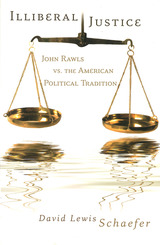
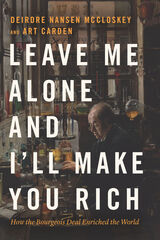
For readers looking for a distillation of McCloskey’s magisterial work, Leave Me Alone and I’ll Make You Rich is what you’ve been waiting for. In this lively volume, McCloskey and the economist and journalist Carden bring together the trilogy’s key ideas and its most provocative arguments. The rise of the west, and now the rest, is the story of the rise of ordinary people to a dignity and liberty inspiring them to have a go. The outcome was an explosion of innovation after 1800, and a rise of real income by an astounding 3,000 percent. The Great Enrichment, well beyond the conventional Industrial Revolution, did not, McCloskey and Carden show, come from the usual suspects, capital accumulation or class struggle. It came from the idea of economic liberty in Holland and the Anglosphere, then Sweden and Japan, then Italy and Israel and China and India, an idea that bids fair in the next few generations to raise up the wretched of the earth. The original shift to liberalism arose from 1517 to 1789 from theological and political revolutions in northwest Europe, upending ancient hierarchies. McCloskey and Carden contend further that liberalism and “innovism” made us better humans as well as richer ones. Not matter but ideas. Not corruption but improvement.
Leave Me Alone and I’ll Make You Rich draws in entertaining fashion on history, economics, literature, philosophy, and popular culture, from growth theory to the Simpsons. It is the perfect introduction for a broad audience to McCloskey’s influential explanation of how we got rich. At a time when confidence in the economic system is under challenge, the book mounts an optimistic and persuasive defense of liberal innovism, and of the modern world it has wrought.

David Ramsay Steele, PhD, is a libertarian writer with a powerful underground reputation for producing caustic, entertaining, knowledgeable, and surprising arguments, often violently at odds with conventional thinking. For the first time, some of Dr. Steele’s “greatest hits” have been brought together in an anthology of provocative essays on a wide range of topics. The essays are divided into two parts, “More Popular than Scholarly” and “More Scholarly than Popular.”
“Scott Adams and the Pinocchio Fallacy,” Steele’s 2018 refutation of the popular claim that we might be living in a “simulated reality,” has been hailed as a totally irresistible debunking of that fallacy as promoted by The Matrix movie and by Scott Adams (among many pundits).
“What Follows from the Non-Existence of Mental Illness?” (2017) preserves the crucial insights of “psychiatric abolitionist” Thomas Szasz, while exposing Szasz’s major misconceptions.
In “The Bigotry of the New Atheism” (2014), Steele, himself an atheist, brings out the intolerant quality of the “New Atheists.” Steele powerfully argues that while “enthusiastic belief systems” may give rise to enormous atrocities, the historical evidence goes against the theory (promoted by Harris, Dawkins, and Hitchens) that these appalling outcomes are more likely when those belief systems include belief in God.
“Taking the JFK Assassination Conspiracy Seriously” (2003) has been reprinted many times, continues to be viewed online many thousands of times, and like many of Steele’s writings, keeps making converts. It is acknowledged to be the most persuasive brief popular statement of the Lone Nut theory.
“The Mystery of Fascism” (2001), which gives this collection its title, is still continually viewed and cited, for its demonstration that fascism arose directly out of far-left revolutionary Marxism and revolutionary syndicalism. Conventional ideologues of both right and left have been provoked by this highly readable piece to start thinking outside the box.
The earliest piece in this collection, “Alice in Wonderland” (1987) is a devastating critique of the Ayn Rand belief system and the Ayn Rand cult.
“Gambling Is Productive and Rational” (1997), mercilessly strips away the loose thinking which favors intolerance and prohibition of gambling. Steele argues that gambling adds to human well-being and ought to be completely legalized everywhere.
Other topics include the recovered memory witch hunt of the 1990s, the benefits of replacing democratic voting with selection of political positions by lottery, the unexpected results of research into the causes of human happiness, the reasons why Dexter (a TV show sympathetic to a psychotic serial killer) was politically “safe,” why economic growth can go on for ever, why the most popular moral argument against eating meat just doesn’t work, how Hillary Clinton could have won the presidency in 2016, why Friedrich Hayek is wrong about social evolution, the inevitable disappearance of market socialism, Robert Nozick’s muddled thinking about economics, and the proper way to view anti-consensus theories such as the Atkins Diet.


“Noam Chomsky is a global phenomenon.”—New York Review of Books
In On Western Terrorism, world-renowned intellectual Noam Chomsky discusses Western power and propaganda with filmmaker and investigative journalist Andre Vltchek. Together they touch on colonialism, propaganda, and the media, and cover topics from the Soviet Union to Latin America to the Arab Spring.
Here is the perfect introduction to Chomsky's political thought and provides an accessible approach for anyone who wishes to better understand the West's fraught role in the world. Admired by some, condemned by others, and feared by all—the military might of the West is undeniably colossal.
Beginning with stories of the New York newsstand where Chomsky started his political education as a teenager, the discussion broadens out to encompass colonialism, imperial control, propaganda, and drone warfare.
Chomsky and Vltchek offer a powerful critique of the legacy of colonialism, touching upon many countries including Syria, Nicaragua, Cuba, China, Chile, and Turkey. The Table of Contents:
1. The Murderous Legacy of Colonialism
2. Concealing the Crimes of the West
3. Propaganda and the Media
4. The Soviet Bloc
5. India and China
6. Latin America
7. The Middle East and the Arab Spring
8. Hope in the Most Devastated Places on Earth
9. The Decline of U.S. Power Timeline
With a fresh design and a new foreword by Chomsky, this edition of On Western Terrorism stands as an influential and powerful critique of the West's role in the world, inspiring all who read it to think independently and critically.

Modern psychological and political theory meet head-on in this powerful re-evaluation of America's contradictory and sometimes dangerous addiction to individualism. Best-selling author Gaylin and co-author Jennings investigate the contentious intersections of interdependence and autonomy, rights and public responsibility. They examine the painful abrasion occurring between America's tradition of personal freedom and privacy, as it rubs against the still valuable if almost vanishing ideals of sacrifice and social order.
Our current culture of autonomy—championed by both liberals on the left and libertarians on the right—is based on the idea of rationality as the motivation for human conduct. But, as the authors remind us, people are not simply rational creatures—appeals to emotions are always far more effective than logical argument in changing our behavior.
This timely edition includes a new preface; updated examples and illustrations throughout; and new coverage of contemporary social critics and their work since the publication of the first edition. Two essential new chapters, one on the movement to forgo life-sustaining treatment and the other on physician-assisted suicide, particularly clarify the authors' arguments. Drawing on these and numerous other illustrations—with significant emphasis on the state of American health care—Gaylin and Jennings demonstrate that society has not just the right but the duty to occasionally invoke fear, shame, and guilt in order to motivate humane behavior.
As cases of AIDS are once again on the upswing, as the dangerously mentally ill are allowed to wander free and untreated, as starvation and poverty still hold too many in its grip in the richest nation on the planet, this controversial book, considerably revised and expanded, is needed more than ever. If we are to indeed preserve and nurture a genuinely free—and liberal—society, the authors suggest that these "coercions" may be essential for the health and the maturity of a nation where we all too often avert our eyes, not seeing that our neighbor is in pain or trouble and needs our help.
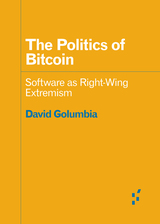
Since its introduction in 2009, Bitcoin has been widely promoted as a digital currency that will revolutionize everything from online commerce to the nation-state. Yet supporters of Bitcoin and its blockchain technology subscribe to a form of cyberlibertarianism that depends to a surprising extent on far-right political thought. The Politics of Bitcoin exposes how much of the economic and political thought on which this cryptocurrency is based emerges from ideas that travel the gamut, from Milton Friedman, F.A. Hayek, and Ludwig von Mises to Federal Reserve conspiracy theorists.
Forerunners: Ideas First is a thought-in-process series of breakthrough digital publications. Written between fresh ideas and finished books, Forerunners draws on scholarly work initiated in notable blogs, social media, conference plenaries, journal articles, and the synergy of academic exchange. This is gray literature publishing: where intense thinking, change, and speculation take place in scholarship.

How ordinary Americans, frustrated by the legal and political wrangling over the Second Amendment, can fight for reforms that will both respect gun owners’ rights and reduce gun violence.
Efforts to reduce gun violence in the United States face formidable political and constitutional barriers. Legislation that would ban or broadly restrict firearms runs afoul of the Supreme Court’s current interpretation of the Second Amendment. And gun rights advocates have joined a politically savvy firearms industry in a powerful coalition that stymies reform.
Ian Ayres and Fredrick Vars suggest a new way forward. We can decrease the number of gun deaths, they argue, by empowering individual citizens to choose common-sense gun reforms for themselves. Rather than ask politicians to impose one-size-fits-all rules, we can harness a libertarian approach—one that respects and expands individual freedom and personal choice—to combat the scourge of gun violence.
Ayres and Vars identify ten policies that can be immediately adopted at the state level to reduce the number of gun-related deaths without affecting the rights of gun owners. For example, Donna’s Law, a voluntary program whereby individuals can choose to restrict their ability to purchase or possess firearms, can significantly decrease suicide rates. Amending red flag statutes, which allow judges to restrict access to guns when an individual has shown evidence of dangerousness, can give police flexible and effective tools to keep people safe. Encouraging the use of unlawful possession petitions can help communities remove guns from more than a million Americans who are legally disqualified from owning them. By embracing these and other new forms of decentralized gun control, the United States can move past partisan gridlock and save lives now.
READERS
Browse our collection.
PUBLISHERS
See BiblioVault's publisher services.
STUDENT SERVICES
Files for college accessibility offices.
UChicago Accessibility Resources
home | accessibility | search | about | contact us
BiblioVault ® 2001 - 2025
The University of Chicago Press


